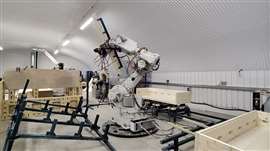Robotics company partners to develop timber houses
28 March 2024
ABB Robotics has partnered with UK-based tech start-up AUAR to develop robotic micro-factories that can construct affordable, sustainable, low-energy timber homes.
 AUAR reports that it has completed a £2.6 million seed round (Photo: ABB Robotics)
AUAR reports that it has completed a £2.6 million seed round (Photo: ABB Robotics)
The micro-factories will construct energy-efficient, affordable buildings from sheet timber. AUAR reports that it has completed a £2.6 million seed round led by deep-tech and AI fund Miles Ahead, alongside ABB Robotics & Automation Ventures and several other investors.
ABB robots are said to be used in a range of modular assembly and 3D printing building projects worldwide, as well as academic projects researching new ways to integrate robotic automation into construction.
AUAR adds that its automated micro-factory approach provides a solution to many of the challenges facing building companies, including supply chain issues, project delivery and quality and skills shortages.
“The increasing capabilities of robots enabled by vision and AI, coupled with their inherent speed, flexibility and consistency, makes them the ideal solution for meeting the growing need for affordable, high quality, sustainable housing,” said Craig McDonnell, managing director of business line industries at ABB Robotics.
“With 95% of building firms in our recent market survey describing sustainability as ‘important’ or ‘very important’ to their businesses, and 38% seeing robots as a way of reducing waste, our collaboration with AUAR opens new possibilities for homebuilders to deliver affordable sustainable homes at scale.”







